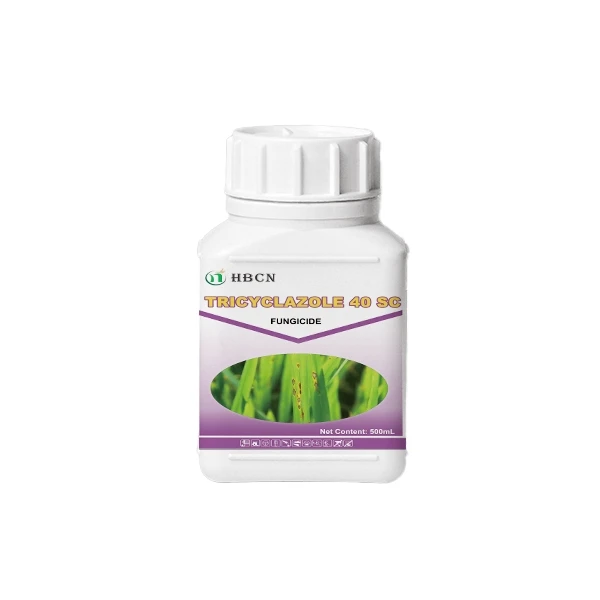
Dec . 26, 2024 15:00 Back to list
Nicosulfuron 40g/L SC - A Powerful Herbicide for Effective Weed Control
The Importance and Application of Nicosulfuron 40g/L SC in Modern Agriculture
Nicosulfuron is a highly effective systemic herbicide widely recognized for its ability to control a broad spectrum of grasses and certain broadleaf weeds in various crops. With a formulation of 40g/L SC (suspension concentrate), it has become a go-to solution for farmers aiming to enhance crop yield and maintain agricultural productivity. This article delves into the significance of Nicosulfuron, its mode of action, application techniques, and its role in sustainable agriculture.
Understanding Nicosulfuron
Nicosulfuron belongs to the sulfonylurea family of herbicides, which are known for their selective action against unwanted plant species. It is primarily used in the management of weeds in corn (maize) fields, making it essential for corn growers. The herbicide works by inhibiting the enzyme acetolactate synthase (ALS), which is vital for the synthesis of certain amino acids in plants. This inhibition results in the stunted growth and eventual death of the targeted weeds, allowing the corn crop to thrive without competition.
Formulation and Application
The 40g/L SC formulation of Nicosulfuron is particularly advantageous as it offers a concentrated solution that can easily be mixed with water and applied to the crop. The suspension concentrate formulation ensures that the herbicide remains evenly distributed in the spray solution, leading to improved efficacy and reduced chances of drift. Typically, Nicosulfuron is applied during the early growth stages of corn, when the weeds are actively growing but before they have established themselves too firmly.
Farmers usually use Nicosulfuron as part of a comprehensive weed management strategy that combines the herbicide with cultural practices such as crop rotation and cover cropping. Proper timing and adherence to recommended application rates are crucial for maximizing the herbicide's effectiveness while minimizing environmental impacts.
famous nicosulfuron 40g/l sc

Benefits of Nicosulfuron
One of the remarkable advantages of Nicosulfuron is its selectivity. Unlike non-selective herbicides that can harm crops along with weeds, Nicosulfuron specifically targets grass species that compete with corn. This selectivity allows farmers to effectively manage weeds without damaging their crops, leading to higher yields and better-quality produce.
Additionally, the use of Nicosulfuron contributes to sustainable agriculture practices. By reducing reliance on multiple herbicides, farmers can decrease the overall amount of chemicals used on their fields. This not only benefits the environment but also helps in reducing the development of herbicide-resistant weed populations, a significant concern for modern agriculture.
Environmental Considerations
While Nicosulfuron is an effective tool for weed management, it is essential to use it responsibly. Farmers should follow state regulations and guidelines to prevent potential runoff and minimize exposure to non-target organisms. Integrated Pest Management (IPM) approaches that incorporate Nicosulfuron can help in maintaining ecological balance while achieving agricultural goals.
Conclusion
In conclusion, Nicosulfuron 40g/L SC represents a vital resource in the arsenal of modern agriculture. Its efficacy in controlling specific weed populations, coupled with its contribution to sustainable farming practices, makes it an invaluable tool for corn producers. As global agricultural demands continue to rise, the role of targeted, selective herbicides like Nicosulfuron will be crucial in ensuring food security while protecting the environment. Responsible use of this herbicide, combined with a holistic approach to weed management, will pave the way for healthier crops and more sustainable agricultural practices in the future.
-
Insecticide Spirotetramat 11% + Thiacloprid 11% SC at Good Price
NewsJul.30,2025
-
Best Abamectin SDS - Premium Quality & Reliable Safety Data
NewsJul.29,2025
-
Agrochemicals Pesticides Solutions for Sustainable Farming
NewsJul.29,2025
-
High-Quality Tebuconazole Fungicide for Crop Protection at Best Price
NewsJul.29,2025
-
Chlorfenapyr 8% + Clothianidin 20%SC Pesticide Mixture for Effective Pest Control
NewsJul.28,2025
-
Best Azoxystrobin Difenoconazole Supplier for Crop Protection
NewsJul.28,2025
